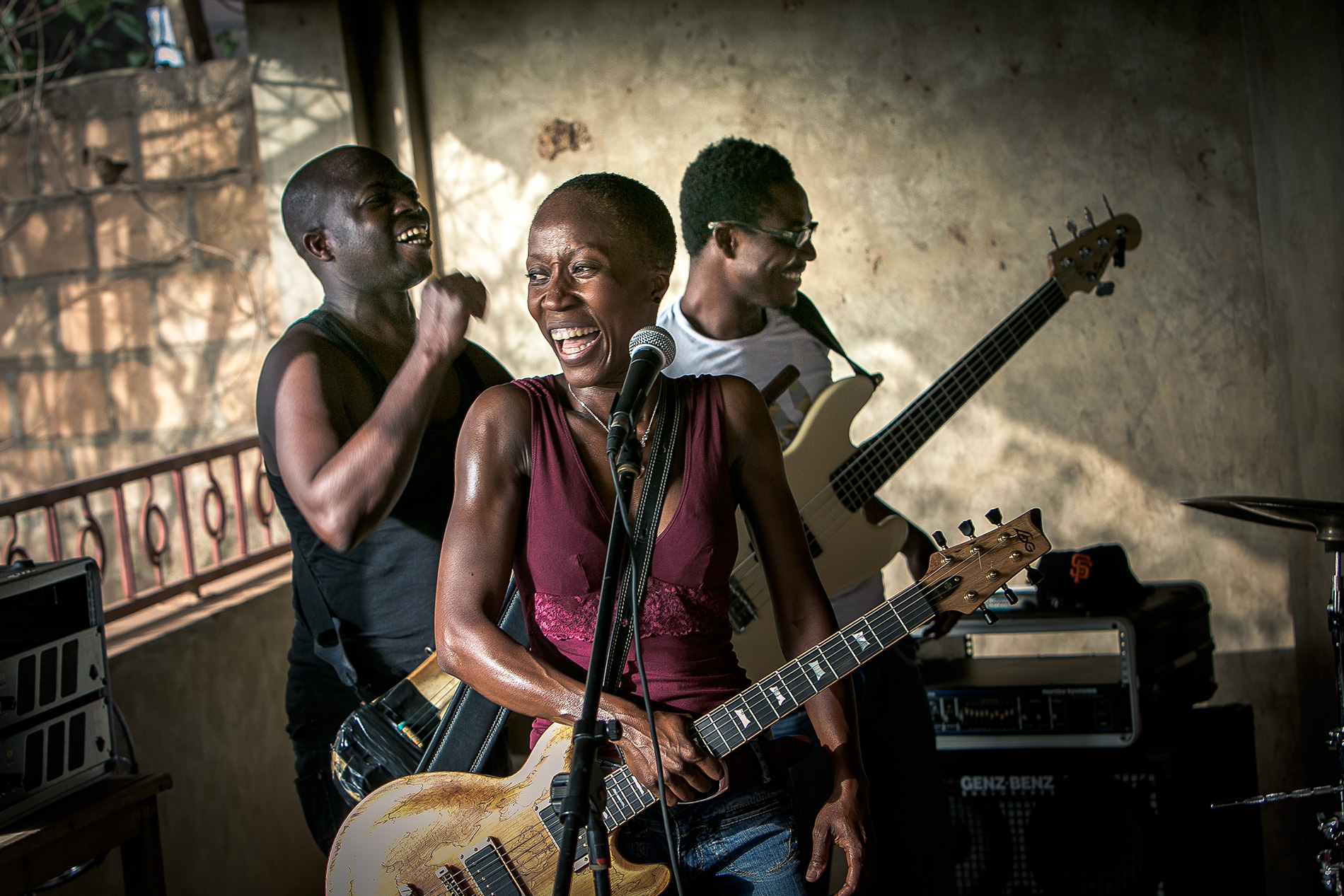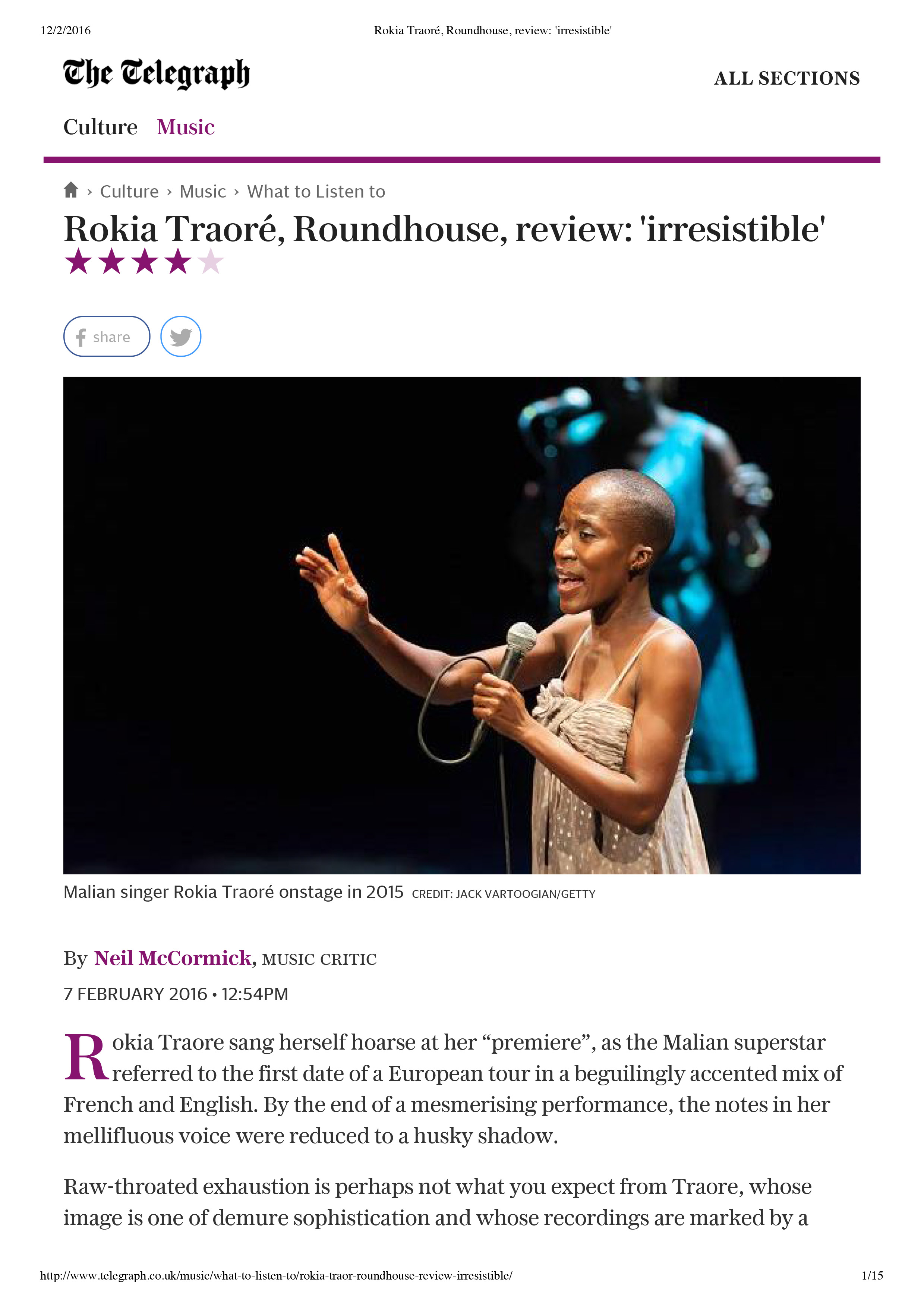
Any goal must have a reason
Any success is based on a reason
Any failure is based on a goal without a reason.
These are the opening words, feverishly sung in Bambara, of the song Kenia in Rokia Traoré’s sixth album Né So (“Home”). And the best way to encapsulate the Mali-born singer’s strength throughout her nearly twenty-year musical path. The decision to take up music may be guided by a career plan, or a burning urge, or an attempt to gain some recognition, or even the desire to pass on a legacy. But Rokia Traoré’s journey is of a whole different kind. Ever since she released her first record Mouneïssa, she has grown her own art and developed a real life philosophy; or a principle, in its etymological meaning: a source, a rule of conduct. This empirically based axiom guiding her actions has always been driven by the force of her will and the movements of her heart. Incidentally, the fundamental question of choices and responsibilities has always been Rokia’s centre of gravity.
Before initiating any new project, Rokia Traoré always asks herself, why keep playing music, and how? This time, she did with unprecedented urgency. It should be mentioned that at the time, she found herself in one of those idiosyncratic situations in her life where private and public worlds collide. Quite a hazardous one, at that. Having grown up as a diplomat’s child, Rokia had always been a traveller; but in 2009, she decided to move back to Mali. Three years later, she was the unfortunate witness to a terrible momentum that gripped the war at higher levels. “Experiencing life in a war-torn country was traumatic. I became aware of how naive I had been – if not guileless, without even knowing it.”, she confesses. While she had to leave Bamako for a while and move to Europe with her son, she also suffered the torments of a life event whose effects questioned her very status and legitimacy as a musician. “To make a long story short, being a female artist, especially an African living in Africa, makes you sound not credible as a mother”, she says. Besides, the music industry was facing a crisis, which only added to her distressing doubts. To the point of almost calling it quits, artistically speaking. But she did summon the energy to not indulge in renunciation. “Everything was falling apart, she says. It’s never easy to go through tough times, but it is also what makes you grow, and understand why you cling to certain things and give up on some others. At some point, I realized that I was either going to make it, or just add my name to the long list of female artists who ended badly. When people write their biographies, they talk less about their music or talent than their personal rifts. I asked myself, ‘Do I want to end up in that kind of books? Or should I take a chance and get on with it? I really had to take decisions. I did, and I’m glad I took the right ones.”
The art of picking yourself up is what Né So is all about, implicitly. Rokia Traoré started by writing and composing the songs alone. She then rehearsed in bamako and recorded in Brussels and Bristol with musicians auditioned from the entire West African region – “I didn’t want an all- Malian band. I need difference, I need a mix of cultures around me”. Né So is at once a return to fundamentals and a step forward. “You could say that Mali is where my roots are – it is where I take refuge in times of doubt, and where I accept to take risks when I must. Bamako was the place where I felt I would be both free and supported. Somehow, Né So reminds me of my first album, because I had to start from scratch and reorganize my way of thinking to move forward, regardless of whether it would work or not. Having to return to my roots under the circumstances reminded me of the time when I stopped my studies in Belgium and returned to Mali to make music. But this time, I had the benefit of experience. When you are older, you can embark on a new adventure without being overwhelmed with the fear of losing the fame you had only started building. Which leads you to make free, spontaneous decisions – the kind of decisions that are in direct connection with what I enjoy in music.”
Rokia Traoré’s band on Né So features Burkinabe drummer Moïse Ouattara, Ivorian bass player Matthieu N’guessan, long-time collaborator Malian Ngoni player Mamah Diabaté, and backing vocalists trained at her Bamako-based Fondation Passerelle. Né So is therefore rooted in the fertile musical ground of the “Beautiful Africa” she praised in her previous record, which doesn’t prevent her from wanting to expand her expressive range, spanning from Mandingue chants to rock sounds, from Bambara through English to French. Rokia still has the same unquenchable desire to meet and share. The album stars Artistic director John Parish (an English musician who also plays the drums and guitar in Né So) and Italian guitarist Stefano Pilia, who had already worked their magic on Beautiful Africa, contributing their expertise and attentive ears. Producer, arranger and multi-instrumentalist John Paul Jones (Led Zeppelin, Them Crooked Vultures…), whom Rokia Traoré had met during the Africa Express collective 2012 tour, plays bass and mandolin on the record. Nonesuch label mate American songwriter Devendra Banhart also appears, singing and playing guitar in the song Sé Dan, an English-sung celebration of human empathy, benevolently chanted by the Nobel laureate Toni Morrison, who shed a humanistic writer’s light on the lyrics. The widespread, subtle diversity at stake in Né So shows, if need be, Rokia Traoré’s skills in building a beautifully human palette to express her visions. “I need collaborations based on common ground, she says. It is not my intention to talk about the world on my own. I want to do it as part of a fellowship of people with shared convictions.”
So showing the world is what Né So is all about, especially the title track, a stunning etching that depicts in a few strophes the distress of uprooted peoples. The album is filled with pain and joy, infused with challenges and hopes, and always nurtured with an uncompromising frame of mind, one of a woman who will neither give up nor overdramatize, whatever happens. Amour, Amour, Tu voles and Obiké are odes to the not-so unbearable lightness of being, while Ilé expresses a healthy disregard of ego-based squabbles and fights. Kolokani pays tribute to the beauty of one’s roots and forebears, and Niélé chants the courage of tomorrow’s grown-up women. More than ever before, Rokia Traoré translates with Né So her burning desire, her vital urge to get home on a tightrope, using a perfectly balanced bar with her personal experiences on one side and the entire universe on the other. Her cover of Strange Fruit, as anchored on the ground as it is aerial, is the culminating point of this new stunt of hers. Rokia already had explored Billie Holiday’s repertoire in Tchamantché, with The Man I Love. This time, she thoughtfully and ardently sings Lewis Allan’s ever so harrowing story of the heinous madness of men, in a time of tension and closure. Such is the humble testimony of a subjective artist placing herself in the context of humanity. Humanity is both what she is dressed in, and what she uses to try and dress the world’s wounds. “I believe what keeps me alive, what keeps all of us alive, is the ability to move from the singular to the universal. This may be what maturity means – to love your life without always being at the centre of it…” Doubtless, this is the reason and the goal behind Né So; Rokia Traoré finally got “home” and is now telling us the story of the world and the human condition in its complex and beautiful diversity.
1- Ô NIELÉ
Bass guitar : John Paul Jones
Drums : John Parish
Guitare : Rokia Traoré
Lead vocal : Rokia Traoré
Backing vocals : Rokia Traoré ; Stéfy Rika
2- O BIKÈ
Guitare1 : Stefano Pilia
Guitare2 : Rokia Traoré
Guitar 3 : Rodriguez Vangama
Ngoni : Mamah Diabaté
Bass guitar : Matthieu Nguessan
Drums : Moïse Ouatara
Lead vocal : Rokia Traoré
Backing vocals : Rokia Traoré, Bule Mpania , Russell Tshiebua
3- ILÉ
Guitare1 : Stefano Pilia
Guitare2 : Rokia Traoré
Ngoni : Mamah Diabaté
Bass guitar : Matthieu Nguessan
Drums : Moïse Ouatara
Lead vocal : Rokia Traoré
Backing vocals : Rokia Traoré, Bule Mpania , Russell Tshiebua
4- KÈNYA
Guitare1 : Stefano Pilia
Guitare2 : Rokia Traoré
Guitar 3 : Rodriguez Vangama
Ngoni : Mamah Diabaté
Bass guitar : Matthieu Nguessan
Drums : Moïse Ouatara
Lead vocal : Rokia Traoré
Backing vocals : Rokia Traoré, Bule Mpania , Russell Tshiebua
5- MAYÉ
Guitare1 : Stefano Pilia
Guitare2 : Rokia Traoré
Ngoni : Mamah Diabaté
Bass guitar : Matthieu Nguessan
Drums : Moïse Ouatara
Vocals : Rokia Traoré
6- NÉ SO
Guitare1 : Stefano Pilia
Guitare2 : Rokia Traoré
Ngoni : Mamah Diabaté
Mandoline : John Paul Jones
Bass guitar : Matthieu Nguessan
Drums & percussion: Moïse Ouatara
Vocals : Rokia Traoré ; John Parish
7- KOLOKANI
Guitare 1 : Rokia Traoré
Guitare 2 : Rokia Traoré
Lead vocal : Rokia TRoaré
Backing vocals : Rokia Traoré ; Stéfy Rika
8- TU VOLES
Guitare1 : Stefano Pilia
Guitare2 : Rokia Traoré
Ngoni : Mamah Diabaté
Guitar 3 : John Parish
Bass guitar : Matthieu Nguessan
Drums : Moïse Ouatara
Lead vocal : Rokia Traoré
Backing vocals : Rokia Traoré, Bule Mpania , Russell Tshiebua
9- AMOUR AMOUR
Guitare1 : Stefano Pilia
Guitare2 : Rokia Traoré
Ngoni : Mamah Diabat
Bass guitar : Matthieu Nguessan
Drums : Moïse Ouatara
Vocals : Rokia Traoré
10- SÉ DAN
Guitare1 : Stefano Pilia
Guitare2 : Rokia Traoré
Guitar 3 : Devendra Banhart
Ngoni : Mamah Diabaté
Mandoline : John Paul Jones
Bass guitar : Matthieu Nguessan
Drums : Moïse Ouatara
Lead vocal : Rokia Traoré ; Devendra Banhart
Backing vocals : Rokia Traoré ; Stéfy Rika
11- STRANGE FRUIT
Guitare1 : Stefano Pilia
Bass guitar : Reggie Washington
Ngoni : Mamah Diabaté
Drums : John Parish
Vocals : Rokia Traoré
Artistic production : John Parish
Music and lyrics : Rokia Traoré
Sound engineer : Aslister Chant ; Pierre Dozin
Photos : Danny Willems
Recording studio : JET STUDIO ; TOY BOX STUDIO
Mastering : LOUD MASTERING
Download the la english press review (PDF)
Pas de concerts programmés



